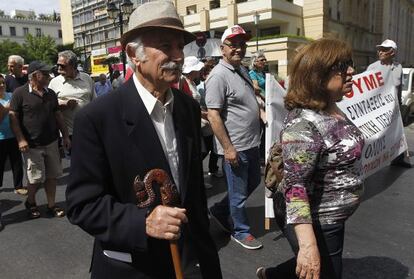Inequality between rich and poor has hit record highs, OECD warns
In Spain, 18% of the population lives below poverty line, twice as many as before the crisis

Inequality between the rich and the poor has reached its highest level in certain countries since the Organisation for Economic Cooperation and Development (OECD) began keeping records 30 years ago.
The crisis has widened this gap in economies such as Spain’s, due to, among other factors, higher taxation and social spending cuts.
A new report titled In It Together: Why Less Inequality Benefits All shows that “wealth is even more concentrated at the top than income, exacerbating the overall disadvantage of low-income households.” The study is based on data from the 34 countries that make up the OECD, which is an international economic organization aimed at stimulating economic progress and world trade. Among the 34 members are 21 of the 28 European Union states, as well as the US, Mexico, Japan, Australia and South Korea.
In Spain, household income dropped an average annual 3.5% between 2007 and 2011, similar to Ireland and Iceland
“In 2012, the bottom 40% owned only 3% of total household wealth in the 18 OECD countries with comparable data. By contrast, the top 10% controlled half of all total household wealth and the wealthiest 1% owned 18%,” says the report.
In Spain, household income dropped an average annual 3.5% between 2007 and 2011, similar to the figures for Ireland and Iceland.
Meanwhile, the bottom 10% of poor Spanish homes lost average annual income of 13% over the same period, while the 10% wealthiest only lost 1.5%.
Pre-tax inequality levels had been stable before the crisis, but soared with the economic downturn and continue to grow despite a slight recovery, says the OECD. This is because of high jobless rates and tax adjustments that have affected unemployment benefits, education and investment. This trend is visible in Spain, Greece and Ireland.
In Spain, there have been additional measures adding to this growing inequality. Fiscal consolidation raised taxes on income and spending (in 2011 and 2013), while social cuts in 2013 affected the lower earners.
Fiscal consolidation raised taxes on income and spending in Spain, while social cuts have affected the lower earners
A rise in temporary jobs and wage differences between men and women also played a role. In this case, the worst performers are Germany, Mexico and Spain.
As a result, poverty has increased between 2007 and 2011. Across all OECD countries, the population below the poverty line grew from 1% to 9.4%. In Spain, that figure is an alarming 18%, nearly twice as much as before the crisis. And it is often youngsters, not the elderly, who are more likely to fall into poverty.
Tu suscripción se está usando en otro dispositivo
¿Quieres añadir otro usuario a tu suscripción?
Si continúas leyendo en este dispositivo, no se podrá leer en el otro.
FlechaTu suscripción se está usando en otro dispositivo y solo puedes acceder a EL PAÍS desde un dispositivo a la vez.
Si quieres compartir tu cuenta, cambia tu suscripción a la modalidad Premium, así podrás añadir otro usuario. Cada uno accederá con su propia cuenta de email, lo que os permitirá personalizar vuestra experiencia en EL PAÍS.
¿Tienes una suscripción de empresa? Accede aquí para contratar más cuentas.
En el caso de no saber quién está usando tu cuenta, te recomendamos cambiar tu contraseña aquí.
Si decides continuar compartiendo tu cuenta, este mensaje se mostrará en tu dispositivo y en el de la otra persona que está usando tu cuenta de forma indefinida, afectando a tu experiencia de lectura. Puedes consultar aquí los términos y condiciones de la suscripción digital.









































